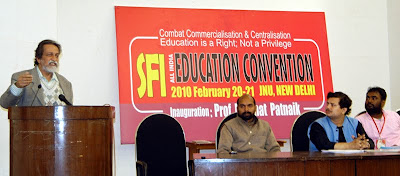ALL INDIA CONVENTION ON EDUCATION - JNU, NEW DELHI- 20-21 FEBRUARY 2010
CHARTER OF DEMANDS
COMBAT COMMERCIALISATION AND CENTRALISATION OF EDUCATION!
EDUCATION IS A RIGHT; NOT A PRIVILEGE!!
GENERAL DEMANDS
v Increase public spending on education to 6% of GDP and 10% of Central Budget.
v No to centralisation of education; Protect the rights of States in education.
v Reverse commercialisation of education; No to FDI in higher education; Bring all private institutions (school/college/professional) under social control.
v Ensure reservation for deprived sections (SCs, STs, OBCs, minorities and economically deprived sections) in public and private educational institutions.
v Ensure democratic rights of students; Hold students’ union elections in all educational institutions.
UNIVERSITY AND HIGHER EDUCATION
v Expand public funded universities and colleges; Ensure adequate hostels, libraries, laboratories and other infrastructure in all educational institutions.
v Provide sufficient funds to State universities; No to fee hikes and user charges for students.
v Withdraw NCHER Bill and Foreign Education Provider’s Bill; No to private universities; Stop commercialisation of educational institutions through NAAC.
v Modernize and democratize higher educational institutions through student participation in decision-making; Upgrade the examination system to reduce students’ workload and enhance transparency; No to centralisation and homogenization of curriculum and syllabi.
v Promote public funded research; Provide scholarship and adequate facilities to all research scholars. Provide Merit Cum Means scholarships to all students.
v Fulfill SC/ST and OBC quota in all educational institutions; Fully implement 54% seat increase.
v Implement recommendations of Sachar Committee and Ranganath Mishra Commission to ensure minorities’ access to higher education.
v Prevent gender discrimination in educational institutions; Promote gender-sensitive curriculum; Provide special scholarship to girl students; Constitute elected anti-sexual harassment committees in all educational institutions.
v Hold students’ union elections in all Universities and Colleges.
PROFESSIONAL EDUCATION
v Collect 5% Cess from corporates to finance expansion of state funded professional educational and training institutions; Expand professional PG courses (BTech/MTech, MCA, MBBS, MD etc.) in the public sector.
v Enact Central legislation for controlling and regulating fee structure, syllabus and admission procedure in private institutions; Ensure 50% Free Seats for students from financially weak background in all private institutions.
v Delegate power to regulate private institutions to public authorities; Ensure transparency in decision making and accountability in all private institutions through mandatory Governing Councils with adequate representation of students, teachers and non-teaching employees.
v Apply stringent criteria regarding quality of teachers and infrastructure before sanctioning affiliation for private professional institutions; Ensure timely updating of syllabi.
v Ensure the democratic rights of the students in all professional educational institutions; Streamline the process of internal assessment to prevent victimization; Form Student Faculty Committees to address academic grievances of students.
v Set up anti-ragging institutions with student participation in all professional educational institutions.
v Encourage Medical students to serve in rural areas to improve rural health services.
v Upgrade ITI and other vocational institutions.
SCHOOL EDUCATION
v Ensure access to quality school education for all; No to different quality schools for elites and poor.
v Amend the Right to Education Act to ensure adequate Central Government funding and the emergence of a Common Neighbourhood School System; Fully implement 25% reservation for poor children from neighbourhood for all private schools
v Immediately fulfill all the vacancies in teaching and non-teaching posts; Ensure 1:30 teacher-student ratio.
v Make mid-day meals till 12th standard compulsory for all government schools; Set up permanent mechanism by appointing a cook, helper and the necessary staff to cook the mid-day meals in schools.
v Expand public schools in backward areas, especially tribal and minority dominated areas; Expand infrastructure in government schools to improve sanitation (especially girls’ toilets), classrooms, study materials and drinking water facilities.
v Strictly regulate school curriculum to ensure scientific, secular, democratic and socially relevant syllabi in all States; Curb the activities of communal organisations in school education

